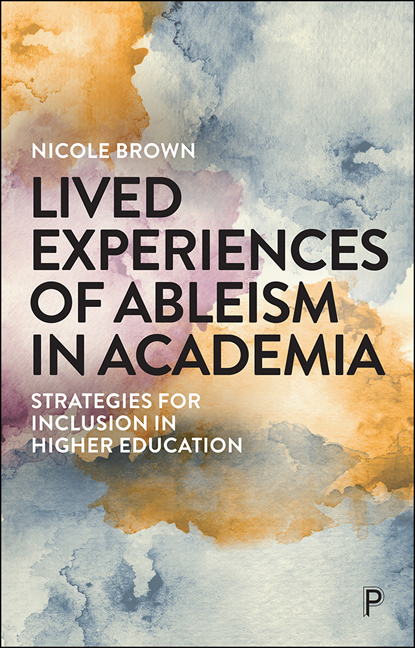Introduction: Being ‘different’ in academia
Published online by Cambridge University Press: 18 December 2021
Summary
Introduction
This book is the result of a long process. In November 2017, I spearheaded the organisation of a conference on the theme of ableism in academia held at the UCL Institute of Education in the spring of 2018. My interest in organising the conference came out of fieldwork, which led to me understanding more deeply the sense of failure many academics experience because they cannot meet expectations placed upon them due to their ill health or disabilities. The response to the conference was so overwhelming that I decided straight away there would be two edited books: one would provide the space for theorising experiences and the second would use the lived experiences as a starting point for recommendations to improve attitudes and practices in higher education. After the successful launch of Ableism in Academia: Theorising Experiences of Disabilities and Chronic Illnesses in Higher Education (Brown and Leigh, 2020), this is now the second edited book.
In this edited collection, members of academia explore notions of ableism in academia from the viewpoint of their personal and professional experiences and scholarship. The book introduces pressures and challenges faced by disabled, chronically ill and/or neurodivergent academics written from the viewpoint of those working in academia and exploring what can be done to help others like them. Of course, lived experiences of illnesses and disabilities are not uniform, and neither are the circumstances and backgrounds of individuals. As such, the experiences presented in this book are merely a starting point to begin conversations around ableism in academia in earnest. As contributors we are aware of our privileges and the responsibilities that accompany these privileges: to raise awareness, to highlight inequities, to present the reality of struggles, to offer helpful, practical ideas and to further the conversation that began with that conference in March 2018.
Higher education in the 21st century
Academia always had the reputation of privilege, with those working in higher education contexts considering themselves lucky to have the autonomy and flexibility that research and teaching afford and that hardly any other profession or job can offer. At the same time, the public narrative includes a discourse of inclusion, equality and diversity within the academy, which again is unrivalled across sectors and professions.
- Type
- Chapter
- Information
- Lived Experiences of Ableism in AcademiaStrategies for Inclusion in Higher Education, pp. 1 - 14Publisher: Bristol University PressPrint publication year: 2021



